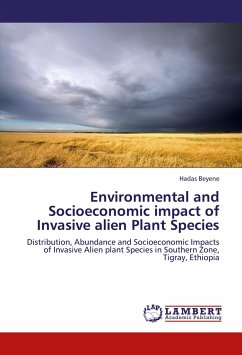The economic policy of Ethiopia aims at ensuring rapid and sustainable development through an agricultural centered development strategy. At this time agricultural ecosystem as well as the biodiversity threatened by different factors like as Invasive Alien Plant Species (IAPS). Invasive Alien Plant Species (IAPS) are posing a significant threat to the country s biodiversity and socio-economic livelihoods through their impacts on agriculture, pastoral lands, horticulture, forestry, fisheries, and other human enterprises as well as human and animal health. They are also causing serious hindrance to conservation and sustainable use of biodiversity with significant undesirable impacts on the goods and services provided by ecosystems. In this respect, Parthenium hysterophorus, Eichhornia crassipes, Prosopis juliflora, Lantana camara, Acacia Spp. and the parasitic weeds: Striga, Orobanche and Cuscuta spp are the widely known major IAPS in the country.
Bitte wählen Sie Ihr Anliegen aus.
Rechnungen
Retourenschein anfordern
Bestellstatus
Storno

